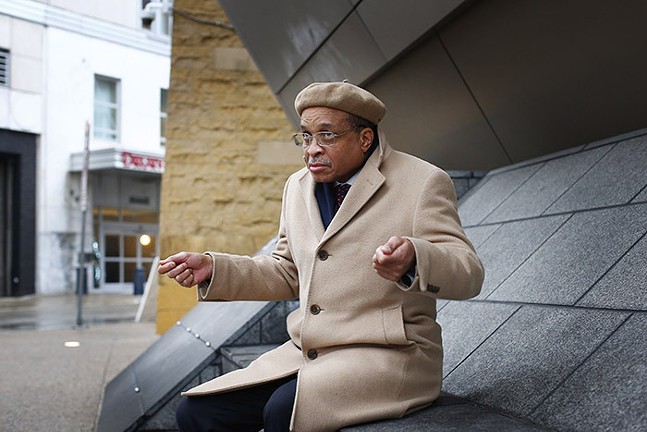
CP photo: Jared Wickerham
Removed: Model Carolina Loyola-Garcia demonstrates a city without a daily newspaper.
P-G journalists have been leafleting like this for almost a year. It’s not something journalists are generally comfortable doing — becoming a story rather than reporting on one. But combined with a byline strike (in which reporters and photographers withhold their names from stories and photos) and social media posts on personal accounts, there is not much more staff members can do to remind readers why they want changes from management in regard to how the paper is run and the staff is treated.
The guild, the labor union that represents P-G staffers, has been in a labor battle over a lack of raise since 2006, years without a renewed contract, and being subjected to several negotiation meetings with a “union avoidance” law firm that have gone nowhere in three years.
The Wednesday evening labor action was about more than that. The atmosphere of the P-G newsroom has been chaotic over the last year, especially after the controversial decision to name Keith Burris as executive editor in February. Burris had become infamous in Pittsburgh and beyond for penning an editorial that downplayed President Donald Trump’s comment calling African nations and Haiti “shithole countries.” The editorial was condemned by several local foundations.
But the fight over contract negotiations has spilled out of meetings between the guild and management and into the newsroom.
Since the start of this year, 20 guild members have left the P-G, while nine managers have either taken buyouts, been fired, or been forced out by management. Another newsroom manager will leave by the end of the year. Some positions have been replaced, but not many. There was a well-documented newsroom tirade by publisher John Block, major editorial conflicts between reporters and management, the surprise early departure of a longtime editor, the print edition of the paper cut to three days a week, and several reporters being assigned new beats, which guild members see as retaliation against their labor actions.
Michael Fuoco, P-G staff reporter and president of the guild, says management is practicing an intentional strategy to make the newsroom so unbearable that guild members quit. “He is driving people out, he’s driving younger people out,” Fuoco says of Burris. “We believe it is a coordinated effort.”
So, the evening leafleting session on Dec. 4 meant more than just advocating for better labor negations. It was an encapsulation of the fight for the future of news coverage in Pittsburgh. “They have now brought the battle into the newsroom, and that has really solidified us,” says Fuoco, who notes that the guild has received 100% participation for the byline strike among staffers. “We are asking people to join us and stand up for the 233 year tradition of the Pittsburgh Post-Gazette.”

CP photo: Jared Wickerham
Removed: Model Rodney Regan demonstrates a city without a daily newspaper.
Though public disagreements between the guild and management have been ongoing for some time, February is when that contention started to infiltrate the newsroom. Burris was named executive editor on Feb. 18, a couple months after former editor David Shribman surprised the staff and left earlier than previously announced.
According to a P-G staffer who has worked there for more than two years, Burris’ promotion was announced with an email sent from Block’s assistant and a piece of paper tacked up to the wall.
“I don’t want to bash him for not being the most charismatic person, but your introduction to the newsroom is just bullet points and historic quotes,” said the staffer, who agreed to talk to CP on the condition of anonymity.
Burris didn’t meet with the full newsroom until days after his announcement, according to the staffer, and he participated in an interview with KDKA before meeting with his staff.
Burris didn’t respond to a request for an interview for this story.
The staffer met with Burris one-on-one a bit later in the year and gives him credit for trying to smooth things over with the staff. But the attempts from Burris weren’t long-lasting. Newsroom staffers continued to drop off, and many were not replaced.
By this fall, tensions remained high and came to a head over planning for the Tree of Life anniversary issue. In April, the P-G newsroom was awarded a Pulitzer Prize for its coverage in response to the mass shooting at the Squirrel Hill synagogue in 2018. For the anniversary issue, Burris came into a newsroom meeting with a list of assignments, before discussing any of them with editors. According to the staffer, on the top of the list was a profile of a white nationalist.
Discord erupted. Eventually, the staff completed most of the assignments but not before having another meeting with then-managing editor Lillian Thomas. According to the staffer, after it was discovered that Thomas intervened to guide some of the reporting on the Tree of Life package, she was moved permanently to the night shift. Thomas left the paper earlier this month.
Around the same time as the Tree of Life arguments, several non-guild editors were being put through a Hunger Games -style competition where three positions were made available for five current newsroom managers, according to an email shared by guild chair Jon Silver. Eventually, three longtime editors were out of the newsroom.

CP photo: Jared Wickerham
Removed: Model Ellen Conrad demonstrates a city without a daily newspaper.
“Just being here for those projects was such a sense of purpose. I am getting to be part of that process,” said the staffer. “The company has sort of sucked the life out of that. It just feels like [Burris] is playing paper sometimes. And it is demoralizing.”
Another current P-G reporter, who spoke to CP on the condition of anonymity, said enterprise positions have all but been eliminated, with those reporters moving to daily beats like Pittsburgh City Council. The reporter said this doesn’t mean enterprise reporting will be totally eliminated, just that reporters will have to complete those projects on top of their daily assessments.
Additionally, several staffers have been reassigned beats for no obvious reason, including an editor effectively being demoted and reporters’ day schedules being moved to the night shift. “Given the recent spike in how many of my colleagues have left, there is this sense among younger people, that there is no sense of job security,” said the reporter.
One reporter who left recently is Christopher Huffaker. He now works in Massachusetts and left because his girlfriend found work near Boston. But he said he recognizes the situation is far from ideal for other young P-G journalists.
“Even in the guild, it wasn’t an environment where you thought the paper was going to grow,” said Huffaker.
Huffaker, who left in September, confirmed details with CP about Burris’ first staff meeting and how his appointment was announced only by email and a piece of paper. He said the announcement was less about Burris and more about the Block family, who owns the paper, saying, “Hey, we are in charge. We can do what we want.”
This dynamic appeared to play out with Shribman’s departure too. Huffaker said Shribman, who had been executive editor for about 16 years, had acted as a buffer against publisher John Block for the last couple of years of his leadership.
Block was known to assign reporters stories that didn’t always align with the hard news the P-G is known for, like coverage of high society or features on dogs. But Shribman would simply ignore those orders or give Block the runaround. Eventually, Block had enough of the deflection, causing Shribman’s ouster.
“The story was that he was leaving because he was doing too much buffering,” said Huffaker. A request to interview Shribman for this story went unanswered.
But this left Burris in charge, whose journalistic experience mostly comprised of writing and editing opinion stories. Add this to the loss of editors with a combined 100 years of newspaper experience over the course of a few months, and the product is going to suffer.
“There are really good reporters and editors that are gone, or other people shifted into different roles,” said Huffaker. “It is obviously going to reduce the quality of coverage. My editor Lillian Thomas, she is a brilliant editor, and she is gone. I believe the paper’s news coverage will suffer from not having her.”
An editor who left this year who spoke to CP on the condition of anonymity said newsroom shakeups and departures eventually led to entire collaborative projects being abandoned. The editor said many of these projects, like a digital redesign strategy called Table Stakes, maintained after Shribman’s departure. But a newsroom tirade from publisher John Block changed things.
In February, Block screamed inside the newsroom in response to a pro-union poster that said “shame on the Blocks.”
According to a first-hand account from the night of the tirade, Block yelled at his young daughter, who was crying, and demanded that she take a photo of him next to the poster. He also allegedly said he was going to fire newsroom managers Virginia Linn and Lillian Thomas, and “talked about firing other managers.” Linn recently left the paper, as did Thomas.
The editor said the tirade shook the staff, and projects that were focused on improving the paper’s business strategy took a lower priority than news coverage.
“How can employees find any motivation to work for such people?” said the editor. “Every single person had to put the public good, the service of journalism, over the way they were being treated.” The editor left because of direction from Burris and Block, and “being put into situations where my ethical guidelines did not align with those of the top editor.”
The editor added that the current decisions by management are very detrimental to the paper. It goes beyond insensitive editorials written by Burris or offensive cartoons drawn in the editorial page. According to the editor, management is hurting the coverage of the reporters and editors responsible for covering Pittsburgh and the region.
“It’s devastating,” said the editor. “They have not only ignored data and proven strategies to bloat their own position of ‘knowing best,’ but they are hurting the very people who are the heart and soul of the paper. They would rather sink the entire paper than admit they need a single one of those talented journalists.”
The reporter who spoke to CP on the condition of anonymity is worried the newsroom won’t be able to accomplish the same type of journalism Pittsburgh expects if the staff keeps shrinking. “Because we have such a large staff, if we lose 16-20 people, we can cover those bases,” said the reporter. "But at some point naturally, there will be a breaking point.”
In the past, Block Communications has justified potential cuts at the P-G since the paper itself is losing money. “We have been covering the red ink,” Block said in a December 2018 article in the P-G . “We can’t be expected to permanently cover the losses.” Block said last year the paper lost $22 million.
However, the guild says the entire Block Communication networks is profitable. The company, which includes cable systems, TV stations, and other media holdings, reported $564 million in revenue in 2018 and makes “tens upon tens of millions of dollars in profits annually.”
As of press time, 139 guild members and 12 non-guild members remain on staff at the P-G. But in May, a former P-G staffer who left earlier this year and wished to remain anonymous told CP that Burris held a meeting with management and told them the Block family was looking to cut about 70 positions from the P-G in about two years.

CP photo: Jared Wickerham
Removed: Model Richard Palagallo demonstrates a city without a daily newspaper.
“It has been a landslide of cuts,” said Dissell.
Before the cuts, the Plain-Dealer had more than 300 staff members. In 2013, the paper split its newsroom into the union Plain-Dealer staff and the non-union Cleveland.com staff. It's unclear how many staff members work at Cleveland.com, but there are only 32 remaining PD News Guild members left at the Plain-Dealer.
Dissell said the shrinking of the Plain-Dealer has led to stories going untold and entire communities not getting coverage.
“This work is not just vital to democracy, but vital in getting information into the community,” says Dissell. “I get a landslide of emails daily, many of them are legitimate stories. I don’t really have time to cover food deserts and poverty.”
Loss of coverage can also mean corruption uncovered, which can lead to higher costs for local taxpayers. Someone has to pay for the lawsuits against corrupt officials; someone has to cover the money lost if it was wasted on a backroom deal.
Dermot Murphy, associate professor at the University of Illinois at Chicago, co-authored a 2018 joint study with the University of Notre Dame showing that decreases in newspaper coverage can lead to higher costs of municipal bonds used by governments to fund infrastructure projects or services.
Murphy told CP in 2018 that Pittsburghers should be concerned about the loss of local newspaper coverage. Large newsroom cuts can lead to increases on the cost of a bond, which are passed on to taxpayers. And as newspapers have shrunk, as they have in Cleveland, it makes the jobs of reporters increasingly difficult, according to PD News Guild chair Ginger Christ.
“We have seen that when we try to go into a community that we haven't covered in a while, they don’t trust us,” said Christ. “I don’t blame them. We have to show that we can be trusted. It takes time.”
Christ believes the tactics from Plain-Dealer’s owners, the cuts and newsroom split, are part of a union-busting strategy. And she sees several similarities to what is happening currently at the P-G.
For now, the P-G guild can only hope their byline strikes and other labor actions will bring the Blocks to the negotiating table. The guild has filed a grievance alleging retaliation against guild unit chair Jon Silver, when he was reassigned beats recently. And the guild will hold a large leafleting event this Saturday, Dec. 14 in front of the Democratic presidential candidate forum at the David Lawrence Convention Center.
When asked if a full-scale strike was on the table, guild president Mike Fuoco said the guild isn’t ready for that yet.
“We have a number of ways to fight back against their unconscionable actions,” said Fuoco. “Right now we are in the fourth week of a byline strike to protest a hostile work environment, and no raises in 14 years. Physically striking the Pittsburgh Post-Gazette, it is an arrow in our quiver, but we are not the point now to take such action.”
As of print, more than 1,000 bylines have been withheld in the P-G over more than four weeks. It’s unclear when or if it will end. But, for the guild and other staff members at the P-G, it's the best way to fight against what they see as an assault on a Pittsburgh institution.
“If in the future they write a study on how to destroy a 233-year-old institution, they will use this example,” said Fuoco.
How can readers help? The Newspaper Guild of Pittsburgh is calling upon the public to “express its outrage” by emailing: • Publisher John Block: [email protected] and [email protected]
• BCI Chairman Allan Block: [email protected] and [email protected]
• Executive Editor Keith Burris: [email protected] and [email protected]

